Freedom
A talk given by Eugene Halliday, transcribed by,
and with arbitrary headings by John Bailey.
The drawings and pictures aren’t originals,
and all editor’s notes are in square brackets.
Audience comment paragraphs are in blue italics
many instances of which are indistinct.
Right! Subject matter: Freedom.
Shortly, we have to say freedom is not total lack of constraint so that energy can operate anywhere regardless of circumstance. Freedom is not total lack of restraint.
Now we shall do a drawing to illustrate this. Ignoring the dots that might be there, imagine a field of light, infinite light ... nothing but infinite light. That infinite light is the light of the Absolute, and is Consciousness Itself without an object.
Now, you all know what it’s like to gaze into a very powerful light ... how it causes halation in the retina, so that you can’t see anything through the excess of light. So that creation of forms which are going to be visible presupposes a shutdown on the amount of light. So that creation is a reduction of infinite consciousness into a state of finitude.
Let the light on the screen [the screen of the overhead projector] represent infinite light. No object there to look at. It is a pure consciousness, objectless ... limitless in every way. Now, that pure consciousness is the godhead ... the source of the God. Most people think that god as creator is the highest. No, but god as creator is a step down from the infinite Godhead ... the Infinite Light of Consciousness.
N![]() ow
in order to produce an object, this light must focus. Now, I want to
represent the focus. Focus means: fo-cus, force-striking. Now imagine
the infinite light, extended spherically in all directions. Imagine
that it has the power — because it is sentient — to look inwards
to itself. Now I’m going to put a little dot there to represent the
focal point. That is, the initial condemna... condensation — I
nearly said condemnation, which would have been correct anyway. It’s
a con-damming [con-damning].
ow
in order to produce an object, this light must focus. Now, I want to
represent the focus. Focus means: fo-cus, force-striking. Now imagine
the infinite light, extended spherically in all directions. Imagine
that it has the power — because it is sentient — to look inwards
to itself. Now I’m going to put a little dot there to represent the
focal point. That is, the initial condemna... condensation — I
nearly said condemnation, which would have been correct anyway. It’s
a con-damming [con-damning].
Now, this in the Hebrew would be represented as a letter yod, which is written like that. It’s the same as the English word jot, or dot. It is a contraction, a contra-action of the Infinite Field of Consciousness. It gives itself thereby a referent centre. And without this referent centre there would be no individuated consciousness of the kind that we call individual human awareness. When we put that dot in the middle of the screen there, we are to think it represents an intention ... an inner tension; psychologically, an intention to have a centre. And there is no centre unless there is an intention to have a centre. The wandering mind without a centre has no proper intention. It is vague, chaotic, meandering, and only if there is inserted into it — or introjected, thrown into it — a particular, finite centre, can there be an individuated being. Now, when that being is thrown down there, that’s a jot of which rabbi Jesus says, not one jot, not one single yod or tittle — a little critical mark — not one of those shall pass away till all the logic of existence shall be fulfilled1.
All form presupposes a positing of a point of reference. Now, when the point of reference is posited, there is a collapsing onto that point of Infinite Consciousness. So that point is equivalent to what the astronomers call a black hole. We’ve got a red hole in this case, because the black pen wouldn’t work. But as red symbolises energy, it is quite correct to use it. It is a focal point of energy. En-erg-y means in-work-affirming [en = in, erg = work, y = ya = affirmation]. It has gone into centre to work on itself.
Now, when it contracts in that way, it makes this focal point which is the very initial beginning of individuation. All individuation is form, and all form is punctilious. All form is individual. It depends on contraction of power to make that form. There [the jot] is our first form. [06:18]
Now, if it stopped at that level, there would simply be a tension [attention] in the middle of the infinite light, and that tension would be simply one point. Whereupon, when we write the name of God — we will write a yod to symbolise that point — and immediately we write that point we see that the space around it is not identical, formally, with the point.
C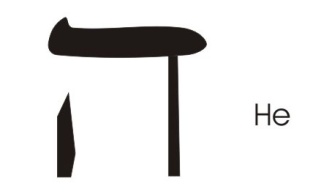 an
we see that? The moment we posit the point, relatively, the space
round it has now become empty. We filled it with the point of
intention. Our life is nothing but intention. We internally posit in
our field of awareness.
an
we see that? The moment we posit the point, relatively, the space
round it has now become empty. We filled it with the point of
intention. Our life is nothing but intention. We internally posit in
our field of awareness.
So around this point there is a field. I won’t put it there, I’ll put it here. This is a Hebrew letter Hè, which means field of life, the life itself. When you say l'chayim [Hebrew] to life — a toast — you’re saying let there be a field of inter-est, a field of interest around this point. But instead of using that square letter, I’m simply going to draw a circle round that point. I want you to see that circle could have been drawn further out, further out, further out ... to infinity.
 dea
Centre
dea
CentreThe field is infinite ... but the intention zone is finite. Now the intention zone is an idea. Idea is Greek for form. Id, it ... ea: life action. Let’s write that word. I, that’s the point. In English we draw the line, then put the dot on top to locate it.
Id is the same as the word It.
[E] Three-fold life, think/feel/will,
[A] activated.
The word idea presupposes a formal intent to create diversities in the life field activity.
Now, we don’t normally spread our consciousness out to infinity, because if we do so we lose formal consciousness. So we tend to zone, to make a Z.O.N.E. That means zealous unity [Z = Zealous, and ONE.] Where the point of focus is, there we centre. And we are aware that round the focus is a zone of less focus. ????2 field. That is the second letter of this name. If you transliterate this, and read it that way — YA — that is the contracted form of Jehovah. Hè means spirit. Hiya: that’s the same as the high in l'chayim. Life, ya, is an affirmation zone in which an idea is emotively charged, deliberately, to create focal, individuated consciousness. So it is said the Absolute posits the yod, or figuratively, He sent down the yod from infinity into finity. And then, coming from infinity, He hits the yod and He goes out to a certain distance and then comes back again, like that.
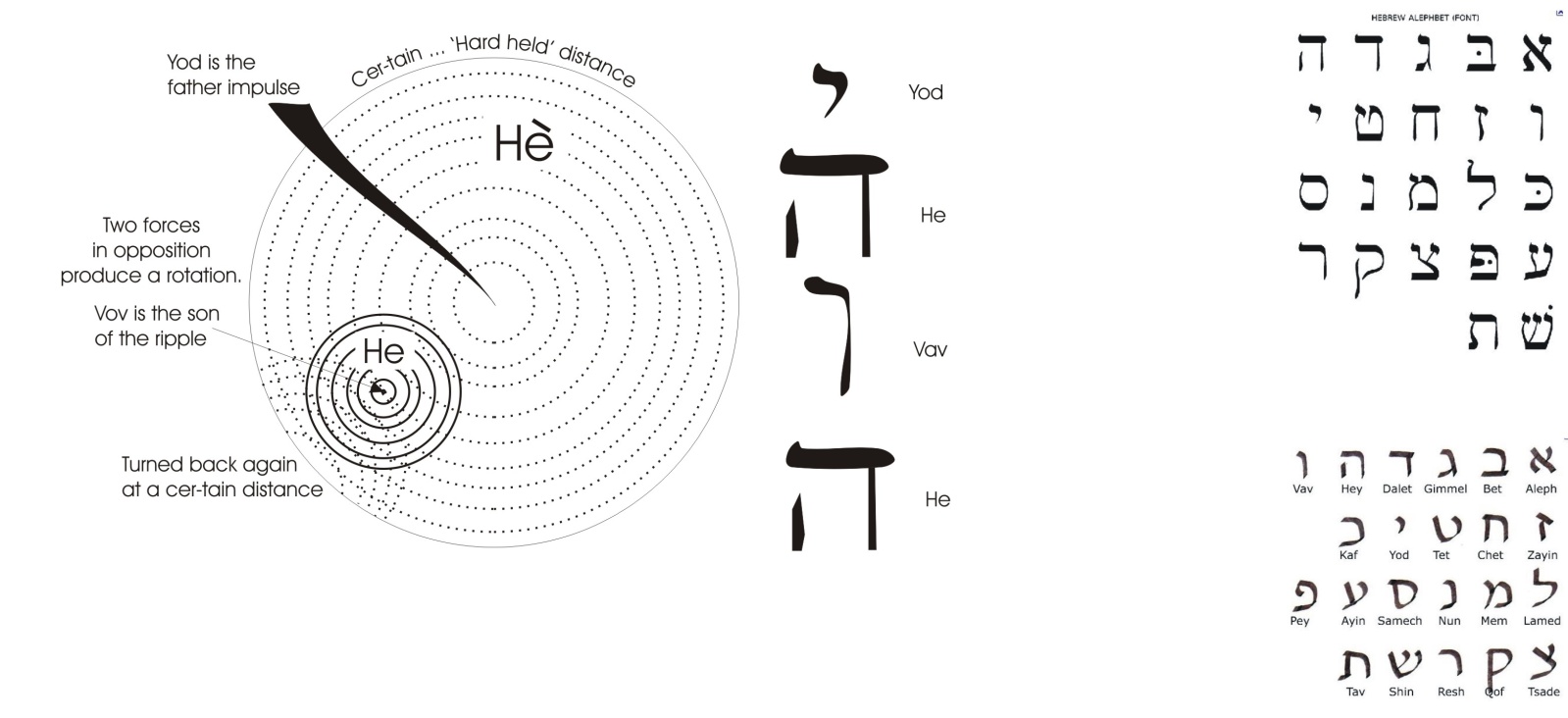
But he goes to a
certain distance because if he doesn’t go to a cer-tain — that
means hard-held —distance, it would go to infinity, in which case
the energy would disperse itself absolutely, and again there would be
no objects of consciousness, no universe, no cosmos, no world ... no
individual being. So the intention to make a thing would produce
static form. And then the Absolute energy presses through the static
form, goes out a cer-tain — that’s hard-held — distance, and is
then turned back again, and pressing into the yod, shoots out of the
yod like that, so the yod shot out becomes a vov, like that. And the
moving power coming out of the first yod there, by the movement of
the ejection, rotates. So I’m going to put a little spin round
there. That’s a vortical spin produced by a moving form. If you
blow air like this [blows air through his lips] into air, the
air into which you blow it ... spins. Round the column of air that
you blow, a field occurs. And because a field has occurred, we must
write again another Hè. You now have a Yod, the Hè, a V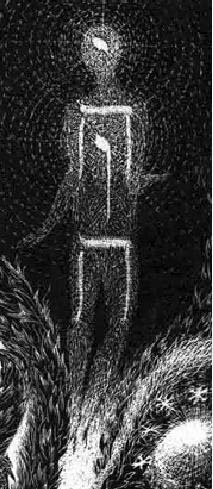 ov,
a Hè, and that is the word translated in English ... Jehovah.
[13:00]
ov,
a Hè, and that is the word translated in English ... Jehovah.
[13:00]
This spinning out force now dynamises the whole process, so that we have a being with an idea, Yod 1 — and I’ll draw it vertically, Yod 1 — a field round the idea, pushing through the yod. The yod becomes a vov, a driving power which develops a field round itself like that, and pushes down until it meets an ultimate resistance ... called matter. When we write this word vertically it’s simply the drawing of primal, cosmic man. That’s Adam Kadmon, primal man. Original man is a being with an idea, a feeling of that idea, a drive from centre, from heart, and a field around the drive. Can you see that it’s quite different in feeling experience to have an idea, and feel the idea is an interesting idea, and just have it in your mind as an idea? [14:16]
A
Detail
from God Walking in the Garden
For a start, we are now going to consider freedom. Now the free part means — and the F is originally a drawing of the Phallus, but does not mean the male physical organ — it means the power of consciousness directed towards an object in a playful manner. Pha-Lus means intelligent play. It is not penile. The word penis and penalty and punishment are all related together. But phallus is intelligent. Penis is not.
When we see that, we see a force which is to become operative. Turn the letter round like this, and it is a squared-off drawing of an Egyptian letter like that. But it does not refer to the physical organ of a male human being or animal. It refers to intelligence. Pha — basis of phenomena — means light. Phal means phi-law, intelligent ratio, plus Lus, which means free play. Phal-lus means free, intelligent, relational interplay ... but intelligent, not stupid. [16:51]
L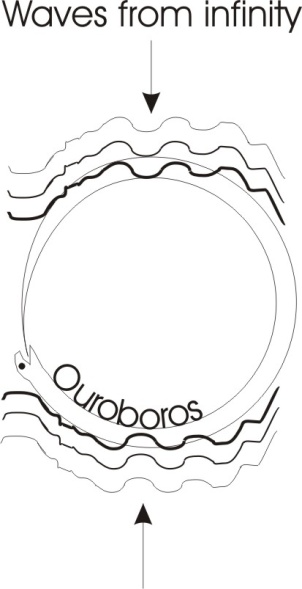 et’s
look at that very carefully. When the dot is posited, it is a
contraction of the infinite. There are no finites that are not
absolute-intentions-to-be. The value of the human individual as
individual is precisely this: that infinity is supporting him,
introjecting its own representative in the individual centre of
consciousness. That is, a developed human intelligence is a god ...
that is, a precipitate of infinite intelligent power.
et’s
look at that very carefully. When the dot is posited, it is a
contraction of the infinite. There are no finites that are not
absolute-intentions-to-be. The value of the human individual as
individual is precisely this: that infinity is supporting him,
introjecting its own representative in the individual centre of
consciousness. That is, a developed human intelligence is a god ...
that is, a precipitate of infinite intelligent power.
Now, if that were to remain only there and nothing else, there would be no relation. So, as we have seen, the infinite comes, presses through that and goes to a certain limit. That is representative of the serpent with tail in mouth. The periphery ... as far as you will to focus. Later on, that will evolve in the animal world and the human world, and that dot will be the pupil, [PU] power [PI] pi [L] law, the learner of experience. And the rest of it will be the ball of the eye. So that is the first drawing of an eye. And the waves of infinity are going like this, making the lids, the constraining forces. A wave passes to infinity that way and this way, producing a stabilisation by opposition of intelligent sentient power.
Now, the space between the dot and the periphery ... that space is a zone of action possibility. The dot itself when contracted down doesn’t move. It’s a centre of reference. The periphery is a limiting factor that stops you expanding to infinity, and so avoids you losing your individuality. [19:37]
[Question from an audience member] Excuse me, how do you focus ... the outer circle, that zone, how does that arise from the idea ... how does it get its distance, focus?
How does the point get its distance and focus? The whole process is in infinite consciousness. And the infinite looking in to itself, in the act of in-looking, posits the point of reference for itself. Simply inter-est in Self creates that point of reference.
Now, look at the space in between, and when we think, if I move my arm like this through space, we tend to think that space is empty or void. But it isn’t. The space is power attentuated, held, to avoid it condensing the whole of infinity upon that point. If the whole of infinity goes onto that point, that would be an intense gravitational centre far worse than any black hole imagined by the astronomers. All reality would condense onto that point and be totally immobilised. So the attention, the tension that generated it, is relaxed and returns; but as we said, returns not to infinity, but to a finite limit and is then turned back again on the centre in a reflexive act ... reflexive, bending back.
Now, our awareness that we exist-as-individual-human-beings is there only when we reflex, when we bend back consciousness. If we become aware of the external object and forget our own being, we get lost in the object. But if we return the consciousness to the consciousness, then we don’t get lost. We retain individuation, because we posit that individuation by intent to know the self. [22:12]
N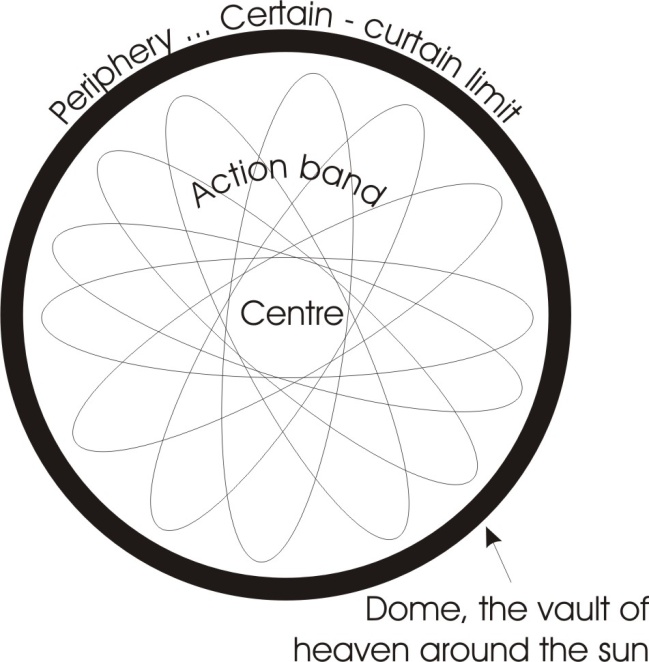 ow,
we can repeat this diagram all the way round, so we can go like this,
and it would go continuously, changing axis like the precession of
the equinoxes, and there would be a continuous generation of a point
at centre, and a continuous maintenance of a periphery, and a
continuous traversing from centre to periphery of the intent to be,
and to be aware, and to be actual. So the zone between the point and
the periphery, we call the action zone. If you’d like me to
complicate it further, I will do this ... you can go all the way
round doing this [drawing on the white paper]. If we do this in this
manner, this is called the mercurial wheel of being, and is actually
a real — not an allegorical — a real diagram of the mental
process that we use all the time ... usually without awareness.
ow,
we can repeat this diagram all the way round, so we can go like this,
and it would go continuously, changing axis like the precession of
the equinoxes, and there would be a continuous generation of a point
at centre, and a continuous maintenance of a periphery, and a
continuous traversing from centre to periphery of the intent to be,
and to be aware, and to be actual. So the zone between the point and
the periphery, we call the action zone. If you’d like me to
complicate it further, I will do this ... you can go all the way
round doing this [drawing on the white paper]. If we do this in this
manner, this is called the mercurial wheel of being, and is actually
a real — not an allegorical — a real diagram of the mental
process that we use all the time ... usually without awareness.
You look out with interest. You take the interest back into centre, see how it relates to my intention. Go out and have another look. And we continuously go to centre and go out and back to centre. And in this process we generate immortality — that is, non-dyingness — because we continuously re-posit.
We die when we lose the interest absolutely. We let go of the object. We let go of the jot, and we let ourselves relax back to the infinite which posited us in the first place. And this relaxation, from the point of view of the existent dots, is death. But that death is an entry into eternal, infinite life. [24:21]
All this is the action band, and we want to show a slight change, an increase in complexity. There is our prime point, and through it from infinity to a certain distance, making a snake with tail in mouth, goes the power of the intent-to-be.
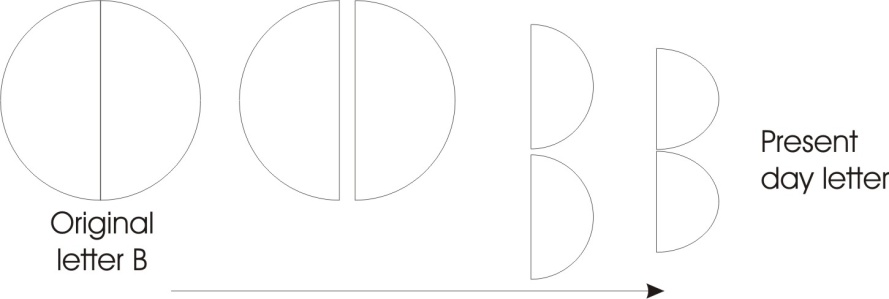 he
Letter B
he
Letter BNow the second letter of the alphabet is B, and the letter B originally was a circle, and then later on they changed it in various ways. In English we write like this. You might not notice that that is really this diagram taken with half like that. Being has two aspects: the gross physical aspect and the subtle, mental aspect. So to be, from the point of view of a bi-ological being — bi- means two — one must have a gross body represented by the periphery, and one must have a centre of initiation represented by the dot in the middle. We are beings of creative initiative ... bound in a world. [25:53]
Now the creative initiative is free. So I’m going to write F for the phallic — not penile — F for the Phallic power, enlightened, which loves to come out and play. When it does so, it writes an R out of the F, which means to differentiate, to discriminate, to pluralise ... to make varieties. So that that base FR as in Friday signifies this power from the centre, positing differences from centre. It’s throwing out possibilities. And as the ... we write the word down here, the phallus — intelligent playing power — differentiates itself and makes of itself a 3-fold life [E. E.], and perpetuates it [DOME].
In a primitive language, if you wish to express continuity, you just repeat the word. Like you would say to somebody, go, go, go, go, until they were out of sight. In this case, it’s in F.R. in life, and repeat E, E, E, E ... life eternal. From the centre of being whirls up a fountain of eternal life, and it goes out from there, and it goes to a distance cer-tain — that is, hard-held — to avoid dissipation in infinity. And then it comes back. Now you can see, the zone immediately near the free here is a field of free power, but because of the certain — that means hard-held — actually the C.E.R. in certain should be pronounced like K – kertain, and the curtains you hang up have the same basic root.
That’s the curbing or curving which turns you around your centre of interest. And this is called the dome. That’s like the vault of the heaven around the sun. And the sun is shining and going out and is being turned back by other cosmic forces to re-feed the solar system, in the same way that the attention of an individual goes out and then goes back to re-feed the person insofar as they have interest ... no further. Now, just as near the centre there where the initiative is, the effect is immediate — so that the innermost part of your being actually knows what it’s doing — so, on the periphery where another of these can be formed from outside and produce there ... contingency. [29:23]
Where the two beings — this is another being over here with the same problem — here they interfere with each other by rubbing, by friction. And we call that the external stimulus. Now just as near the centre there is a very clear and obvious fact, the initiative has not yet had to fight much of the power around that zone. But the nearer it gets to its periphery, where it encounters another being ... the more inertia it encounters.
So we’re going to draw another circle here, like this, and this one represents your integument ... your skin, if you like. So we have in this part a spinning inertia like this, and this maintains, by inertia, the being of the body. And this is the dome that holds in the light. There is the light of the initial idea, I will be an individual, or as it says in Islam, God, Allah says, I was a hidden mystery in the infinite. I desired to manifest, therefore the creation of this idea, and the pushing through the idea to make the world of diverse beings. [31:17]
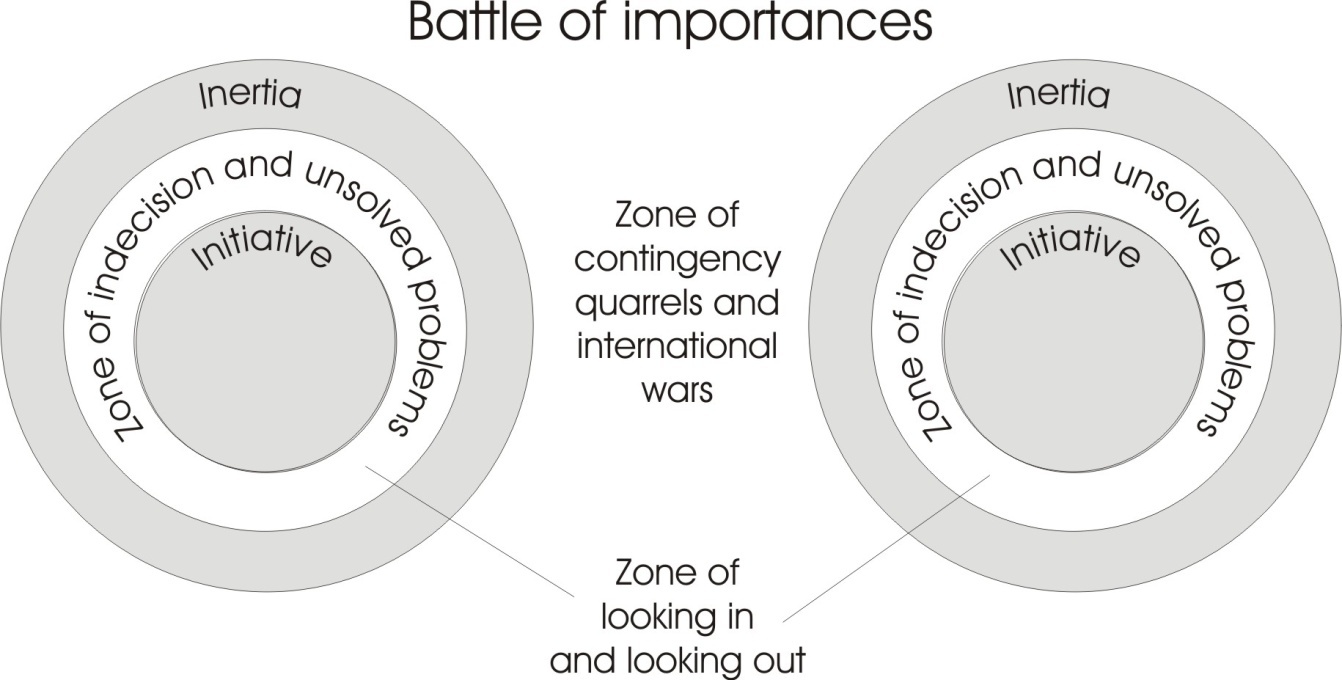
So we now have a zone, the external part of our being ... very inert and very subject to interference by other beings. You all know what it’s like to be interfered with by other beings, don’t you? Especially when you’re trying to do something you consider important which somebody else — usually your spouse —thinks is not important. And the battle of the importances. Import means carryy in, import means carry in. Two different centres are in-porting, importing, have a different opinion of reality, so when they come to the zone of contingency they interfere with each other. And all quarrels and international wars, and the battles of life forms, the viruses, the bacteria, the animals eating each other ... they’re all peripheral fights. But between the centre of initiative there, and the zone where the initiative is still effective, and the zone of inertia here, there is a zone between. And that zone can look two ways. So we’ll have a way looking in towards the initiative, and out towards the inertia. Now, it’s in this zone here where indecision, unsolved problems in the human being exists. They don’t exist there, that’s the zone of reactivity of the gross material order [external, inertic band]. They don’t exist there, because that’s pure initiative. But they exist in the place where there is looking in and looking out, without a decision to give supremacy to one or the other.
Now, the free spirit is domed by being in a physical vehicle ... the body. If he hadn’t got the body, he couldn’t be an individual. If he has got the body he’s got a limitation, and we look towards the body externally, and towards the initiating spirit internally. And between we have this wonderful zone of ambiguity ... shall I be a spiritual being, or shall I be a gross material being? [33:56]
Now five to eight tonight I had a phone call from a man that said he had a lot of friends that enjoyed themselves without conscience. And he said, I wish I hadn’t got a conscience. Every time I do something stupid, I feel awful. All my friends when they do something stupid, say, “so what”. I wish I hadn’t got a conscience.
Well it’s a bit late when you develop one, to wish you hadn’t got one. The only thing to do if you’ve got one is ... get rid of it. When you get rid of it, you are called in realm of yogi, whose works are neither black nor white. But you can’t get rid of it until you have understood that con-science means with knowledge, the totality of your knowledge: the impossibility of two centres agreeing about what to do on the periphery.
Stroke me.
Ok. I stroke you. But do I stroke you the way you want to be stroked?
Ever had an itchy back and asked a friend to scratch it? Does he find the right place? And if he does, doesn’t it move? Don’t you say, er, a bit higher, a bit lower, a bit ...? As soon as you become interested, you energise. When you energise, the energy radiates. It moves. There’s a lovely negro song about that ... which I will not sing to you. [35:42]
Now here we are with the real meaning of freedom. Freedom means a contradiction between pure absolute initiative and total subjection to interference from without by other beings. And to balance those two powers is real freedom. To be able to use our initiative, and at the same time be aware that other people have got some too, and even allow them a bit now and then, intelligently ... that is real freedom.
It isn’t merely free. Merely free is utterly careless.
It isn’t merely dome. Total doming is death.
It is a supreme balance made by intelligence between my will and your will. I make allowances for your initiative. You make allowances for my initiative. The perfect balance of mutual allowances is freedom. If there are no allowances, there’s no freedom, and if you move then, extrovert the attention to the body, all you’ll get is physical irritation, and probably a local war. [37:20]
The number of divorces in this country is about one in two now. In America it’s about one in one. It’s caused through coming to the periphery of being, and one being trying to persuade another being to abandon its unique individuality, and do that which the other being requires it to do ... without argument.
So the winner in this battle is the one who understands that the free initiative has to make allowances for an infinity of free initiatives elsewhere ... without complaining. Now if you’re terribly quick in making the allowance, and you know why you’re making the allowance, you can avoid the petty wars that are called domestic squabbles, by simply seeing the end result of a process before it arrives. When it is not worth it, you don’t release the initial stimulus.
How many times have you felt a rude word coming on the tongue in response to a rude word, and instead of inhibiting it you let it out? And that begets another ... that begets another. And then you have turbulence, and a quarrel ... only because you didn’t inhibit the tendency to be one up on your opponent. But if you allow your opponent an infinite right to be unique, and you allow that freely, intelligently ... then there is no quarrel. There cannot be. [39:09]
Now, looking at freedom in this way, is it possible to have freedom without self-control? Not possible. Self is the field of awareness, the whole field. We’ll write that letter again, that’s the letter Hè, which means life. And there’s a little hole there for life to go in and out. In the ideographic base of it, it’s a window. And a window is not something you look out of, it’s something that lets air in and out of the building, so you can breathe. It’s a breathing hole, a wind hole.
L
 ife
is free. It’s no good having walls to a house, and then shutting
all the windows and doors and sitting inside and refusing to go out
for a breath of fresh air. You will die. So that you must have this
breathing hole so that life air can go in and out. [40:20]
ife
is free. It’s no good having walls to a house, and then shutting
all the windows and doors and sitting inside and refusing to go out
for a breath of fresh air. You will die. So that you must have this
breathing hole so that life air can go in and out. [40:20]
Now the whole [hole?] of infinite life is represented in that letter. So we can actually do another interesting diagram. Here is a square form, although originally it was written like a circle, representing life force with a breathing hole, for getting out. And inside it, it, by self-condensing, has made a little yod or dot, or point of individuation. It, the life infinite, has made the individual.
Now egotism thinks the individual has a claim on life. It hasn’t. Life has posited the individual. It is for the individual to learn the law of life and obey it. So there we have a big Hè, life itself, and then the positing of the field and a small Hè round that one. And then the drive of the power of the life field through the inner life field makes for itself an elongated yod or dot, and that’s your life drive. And then we put a circle round this triad here, again, serpent-with-tail-in-mouth. We now have three letters inside a circle, and one outside. Now let us call the circle the isle. I’ll write the word isle, I.S.L.E. Actually the word isle means is god. Read it this way: is el. El is the name of god. It means first trine worker, the power that thinks and feels and wills simultaneously, and therefore is always in charge of itself. It is the isle of the blessed.
The isle of the blessed. Well, we say, in English, is-land, don’t we? Land of Isness: the land of being a being — an individual spirit by the encapsulation process — the doming. Unless we affirm this dome, we are at the mercy of an infinity of possibilities invading our mind. Millions and millions of inventions not yet invented historically are going to be invented, because they’re in this field of life power, and they are pressing in to the island of the blessed. Be lessed ... this island is less than that infinite. [43:39]
So, bless you means to reduce you to the island. I accept you’re being less. You are being less than you would have been in the infinite, by becoming an individual. And in becoming the individual in this way you have rescued yourself from the infinity of brilliant inspirations which, if you got them all at once, would totally immobilise you. Take the history of inventions since the invention of the wheel, the lever and fire. Those three little inventions have produced concord, have produced space travel, will produce space platforms. [44:32 ... break in recording]
Millions and millions of inventions are in the field of intelligent power, waiting now to be discovered. And every time they are discovered, somebody says, Oh, how simple! Why didn’t we think about that before? But you can’t think about something before you think about it. You can only think at the moment you think of it. There are millions, billions of pounds to be made by inventions which are buzzing like this in the field. An egotist says, where are they, let me get my paws on them, let me convert them to cash. But the field is in charge, not the ego. And the field lets out an invention in a given century when it is ready, and not beforehand.
Now this is called the island. An anthropologist would call it of-the-Tonal. Island of tone – al. TONE is voice and AL is god. The island of the voice of god. Now every individual, within his limit, up to his own skin surface, is a god. He is creating him, by his preference for himself.
Archbishop Ramsey said today, we have to have a re-evaluation of Christianity now. We’ll never get those people back in church unless we say something different and up-to-date. But we must not lose the essence of the teaching. [46:22]
Now many people are frightened of bishops who are alert and intelligent and want to bring it up to date. Many passive believers don’t want to come up to date. So they are frightened of the bishop pronouncing, Oh, let’s change the form. Let’s change the ritual, let’s change the interpretation.
We don’t want that, says inertia. We don’t want it.
But the intelligence at the top, the better-equipped bishops and archbishops, they know life is in charge of evolution. When the life-field condenses onto the yod, that movement is called involution. And when it gives an idea to the yod, and pushes it down like that, it goes into the periphery, that’s called evolution. In-turning or in-willing ... out-turning. There is no evolution without prior involution.
Now, every single individual being — from a virus, a microbe, to a human being — are all determined from centre or periphery at any moment. They’re either initiating or inert. If initiating, they are called saved, if inert, they are called lost. [47:56]
The tonal is the unity ... the T1 in music, the tone. And outside it, is a wandering power which again has another name. And this name means snake, condensed appetite, god; means a power that by simply condensing says to itself, I am the god, I don’t need to take orders from anybody in the island. I’m going to move in space, and I’m going to strike ... and tempt, present the island beings with temptation, a time stimulus. And I’m going to continuously try from all points to upset this being. None shall attain to true individuality except under the conditions of temptation. You can’t be saved by being protected from temptation. You can only be saved by going into temptation and coming out of it with an intelligent response.
This word means a snake appetite god. The appetite — no consideration of individuality — swallows this and that and the other indiscriminately. It destroys things, where the being on the island is trying to build. The sea is lapping round the island and wearing it away. The island is continuously under attack from the forces outside the island.
N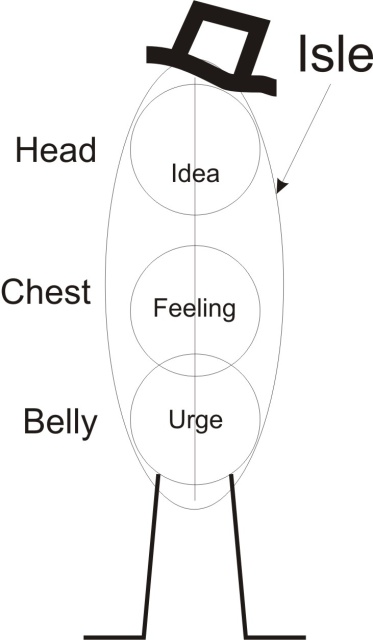 ow,
it’s only this island which is the domain of the freedom-knower.
There is no dome outside, so the concept freedom hasn’t got
an application outside. Free has, yes, but not dome.
Only within the island have you got this free-dome. And the dome
means, one must control one’s appetite and educate it to become
intelligent, otherwise it will destroy the very principle of
individuation.
ow,
it’s only this island which is the domain of the freedom-knower.
There is no dome outside, so the concept freedom hasn’t got
an application outside. Free has, yes, but not dome.
Only within the island have you got this free-dome. And the dome
means, one must control one’s appetite and educate it to become
intelligent, otherwise it will destroy the very principle of
individuation.
Mental hospitals are full of people who, through lack of education, have failed to integrate their mental content.
Here is the same present man, drawn as a figure standing himself in the infinite space of life. He has an idea and a feeling, and he has a drive and a going-about. And the three here are in the island, and the legs going about on the earth are separate. Now if we say this is the isle, this one is ex-ile. So the life exiled — outside the island — has no power within the island. The individual has power only within the circumscription of his own definition of his own being. Own, means owed to the infinite field of life power.
How do we feel about this? We think, we feel, we drive. But the moment the drive drops down like this — there it is — the moment the drive leaves the heart, which is there, and falls down there, we get an unbalanced figure, don’t we? The drive has carried you into the external world, and you have become subject to contingency, to stimuli by other beings ... and you’ve lost your centre of reference. To keep your centre of reference up there in the heart, is to have feeling, compassion for the other beings in the universe. If every act you did was determined by compassion for the person to whom you were doing it, you would not fall. But if it becomes nothing but my way, regardless of your interest, that’s called the Fall, where the heart is left and the physical genitality operates. [53:32]
Now it says, only by
taking on his shoulders a sin can the Messiah save the human race.
And the letter sin, shin in Hebrew is like that. If we put a point
there it’s pronounced shin, if we put it there, it’s called sin.
And if we put it on that one, it’s this one that’s been pointed.
If we put it on the intelligence [shin], t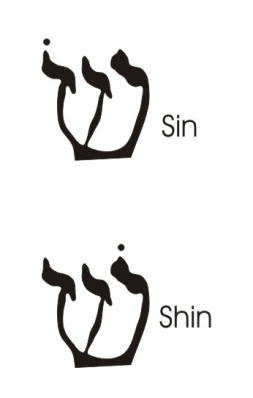 hat
one is being pointed, because this letter is nothing but two close
together there [on the left] and one far off, there. That’s the
form of the letter shin. If we then write that letter here on the
shoulders, and that means take upon yourself this true idea.
All things whatever in total reality are plays of energy. And this
letter signifies fire. And the name for a man, ish, in Hebrew,
means fire. Man is fire. And it says I issue [ISH] hierarchically [H]
... that is, in an orderly development of power. [55:05]
hat
one is being pointed, because this letter is nothing but two close
together there [on the left] and one far off, there. That’s the
form of the letter shin. If we then write that letter here on the
shoulders, and that means take upon yourself this true idea.
All things whatever in total reality are plays of energy. And this
letter signifies fire. And the name for a man, ish, in Hebrew,
means fire. Man is fire. And it says I issue [ISH] hierarchically [H]
... that is, in an orderly development of power. [55:05]
By taking on yourself this idea, you’ve saved yourself. The idea the universe is energy, symbolised as fire. Heraclitus says it: the universe is only fire ... energy on the move. No man bathes twice in the same river, or has the same thought consecutively with another thought. All is change, Panta Rhei3 ... everything is flowing.
Now, if we accept this idea, everything without exception in the universe is power ... symbolised by fire. I’m a devouring, a consuming power, says God in the Bible. Energy. All is energy. Now if you accept that, you are saved, because you don’t fall into thinking that another being is merely a body of matter. Because you remember it isn’t a body of matter, it’s a body of power: a body of fire, a body of interest, a body of feelings, a body of will. [56:21]
How many times do people fall into the error of thinking that the other person is a body to be manipulated?
More often per day than any other error.
They treat the other person as an inanimate thing that can be manipulated by smiles or jeers, or kind words or rude words, or even by physical blows. To treat another person as a thing that can be pushed around is this fundamental error. And the favourite is to recognise this marvellous letter shin ... fire. Every person you know is fire. Every person is condensed.
Ia, ich weiss, wo her ich dammer, says Nietzsche. I know from where I descend ... from fire. Everything that I touch sets on fire. And we cannot relate to other people as if they were things with no fire in their centre. Don’t they become enraged if you try to push them about? They may bottle it, but they do something with their energy reactivity later. It might be a road accident, or a piece of burning toast. It will be something. So if we accept totally, all is energy, symbolised by fire, we cannot find a single being, not the tiniest little insect, that doesn’t fight back if we spray it with DDT. There is no such thing as a non-reactive being, because all is energy ... power, fire.
Here’s a nice little word [pyre]: that’s the same pyre in pyrex cooking dishes. It means fire, but it also means reason, pi ratio. It means a mouth, affirming differences.
|
Supposing we put the letter there, that means mouth, |
|
|
and we put a yod there which means form, |
|
|
and we put a resh there, which means differences. |
|
We’ve now written for ourselves this word, only we’ve written it this way, Hebraica, and say a mouth forming a difference. The mouth is substantial [M] zone [O] of crucified [T] power [H]. Out of the mouth are the issues of life. You open your mouth, a word comes out. The word is a stimulus, a differentiator, an R. It differentiates the organism of the other person. A million reactions occur inside.
Remember that person bottles them. He doesn’t want you to know, I’m really furious. Would that suppress into the unconscious, there will be an accident caused by your careless speech.
W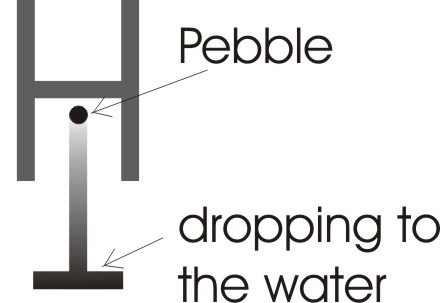 ith
Pi — there’s pi in Greek that’s the pi of pi ratio
— let’s take H for hierarchical power, and height, and put a
letter T upside down like that, just like a T.V. aerial. The height
from which we drop a pebble that hits the surface of the water —
the height — determines the way the waves will bounce from that
point, and gradually diminish, and this is called point of impact.
And if the amount of power in a situation is exactly balanced with
the amount of intelligence or pi ratio — pi ratio is the ratio of
the circumference and the diameter of the circle or the radius —
pure rationality is Pi, and pure hierarchical power is H. And when we
put the two together in perfect balance, you have the marvellous
word, Ha-Pi, which in English is Happy. [1:01:26]
ith
Pi — there’s pi in Greek that’s the pi of pi ratio
— let’s take H for hierarchical power, and height, and put a
letter T upside down like that, just like a T.V. aerial. The height
from which we drop a pebble that hits the surface of the water —
the height — determines the way the waves will bounce from that
point, and gradually diminish, and this is called point of impact.
And if the amount of power in a situation is exactly balanced with
the amount of intelligence or pi ratio — pi ratio is the ratio of
the circumference and the diameter of the circle or the radius —
pure rationality is Pi, and pure hierarchical power is H. And when we
put the two together in perfect balance, you have the marvellous
word, Ha-Pi, which in English is Happy. [1:01:26]
Now, those of you who know anything about, say, woodworking tools, know that you get a saw and start to saw, you let the weight of the saw cut the wood. If you press onto the saw too hard it will jam into the wood and it won’t saw. It will cut it, but it won’t saw. There’s a correct amount of pressure. And when the power, pressure, balances exactly the form that you want, you are happy. If you don’t balance your power with your intelligence — intelligence is the key, because that key is the mouth or voice of verbal expression — if you don’t balance it, you cannot be happy. If you do balance it, you cannot help being happy.
Happiness is that very state of balance from the height of your supremacy over the P pole. Noblesse Oblige. If you think you are very clever up there, be kind to the beings down there. It’s stupid to get a hammer and hit the waves, or scourge them with a whip like Xerxes. It doesn’t calm them ... it agitates them. [1:02:45]
S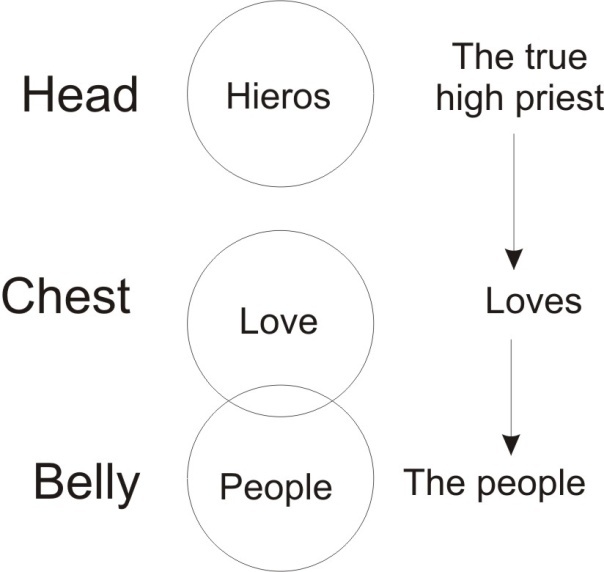 o
the perfect balance of H and P, of hierarchical power/consciousness
and the verbal expression of it, is the true relation between Hieros
the priest, and the people. These are the people down here. And
observing this word, Love. Hierarchical power, individual awareness
... love. If you love the person with whom you are interrelating in
a hierarchical manner — that is, with due regard to their actual
powers of assimilation — you are a true Hieros, you are a true high
priest. If you don’t love them, you are just deficient in the way
of relation. The application of hierarchical power to the person
requires noblesse oblige: it requires you, to the degree that you are
strong, so you are to be merciful. Strength doesn’t mean
unkindness, force. It means understanding, emptying and allowing. No
person of the people can assimilate more than, at a given moment of
their time organisation, their being allows him to assimilate.
[1:04:22]
o
the perfect balance of H and P, of hierarchical power/consciousness
and the verbal expression of it, is the true relation between Hieros
the priest, and the people. These are the people down here. And
observing this word, Love. Hierarchical power, individual awareness
... love. If you love the person with whom you are interrelating in
a hierarchical manner — that is, with due regard to their actual
powers of assimilation — you are a true Hieros, you are a true high
priest. If you don’t love them, you are just deficient in the way
of relation. The application of hierarchical power to the person
requires noblesse oblige: it requires you, to the degree that you are
strong, so you are to be merciful. Strength doesn’t mean
unkindness, force. It means understanding, emptying and allowing. No
person of the people can assimilate more than, at a given moment of
their time organisation, their being allows him to assimilate.
[1:04:22]
S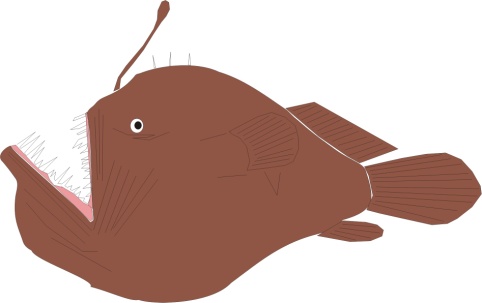 o
if a person down there. We say below the water down there, very deep
down there, the bottom of the ocean ... there are fish this shape.
You’ve probably seen them in the documentaries. Very slow moving,
very dim-witted appetite. The deeper you go down into matter, the
dimmer the consciousness, and the less capacity for assimilating the
meaning of hierarchy. So the one that understands, or believes he
understands hierarchy, is under the law of noblesse oblige. As I am
intelligent, so I am required to make allowances for the stupid. Not
to abuse them, not to misuse them, not to dupe them, not to take
advantage of them, but to help to enlighten them ... gradually lift
them up.
o
if a person down there. We say below the water down there, very deep
down there, the bottom of the ocean ... there are fish this shape.
You’ve probably seen them in the documentaries. Very slow moving,
very dim-witted appetite. The deeper you go down into matter, the
dimmer the consciousness, and the less capacity for assimilating the
meaning of hierarchy. So the one that understands, or believes he
understands hierarchy, is under the law of noblesse oblige. As I am
intelligent, so I am required to make allowances for the stupid. Not
to abuse them, not to misuse them, not to dupe them, not to take
advantage of them, but to help to enlighten them ... gradually lift
them up.
Near the surface of the water there, there is some atmosphere, some humidity making clouds. And the water content there is less than it is down there. And here even less and less and less inertia. Let’s connect this up here. We’ll put a little Masonic one out of this now; this is from the ancient time, thousands of years ago. That’s H. T. We’ll turn it into a more modern form ... T. H. That’s the templum, this Temple Hierusalum of the prince of peace ... the master of peace. That is his sign. Let the centre be made of three letter ‘T’s like that. And then you simply straighten them out and you have the temple of Jerusalem, the temple, the time play of the sight, or vision-of-peace-city. When the three hammer into that centre there ... to complete our diagram let’s join it up like this. And we now have for the three, thinking and feeling and willing, the positing of the idea. And we are back to our original diagram.
Now this is our task as human beings. The animals do not have this problem. The human being is midway between the grossest material darkness and the highest divine spirit. It is the human being and not another being that has to get hold of this opposition and unite above and below together in his own being. And he does it by hammering thought, feeling and will, onto the idea of the truth ... the truth, the idea and fire. That’s our word eesh again, read this way. Man is an idea-being of fire.
How do you feel if you think I’m sitting here, apparently quiet ... I’m relatively an inferno of unfulfilled purposes? I have the idea. I could do marvellous things that I haven’t yet done, and I haven’t done them. How do I feel if I know I’ve an infinite potential and I’m not realising it? How do I feel? Answer: dissatisfied, suffering from anxiety neurosis. Until we can fulfil the idea with our energy, we are not truly eesh ... we are not man yet. Any Yiddisher momma would say to her errant son, hier mensch. That means count properly, evaluate. Remember you are a human being. You are eesh, you are fire.
You have an idea; you have energy. If the idea is a good one, energise it. Push it, establish it, put it into being. Otherwise you will fret, because you had an idea and didn’t realise it. And the unborn idea does not forgive you.
How do you like that for a terrifying thought?
Every time a human being has had a good idea, he felt, I could do that if I were to gather myself together, posit myself ... and then hasn’t done it. Er, I’ll do it tomorrow, and tomorrow and tomorrow, and then they suddenly see a full page ad with the idea, on the market. My god, there is my idea. How do you feel? It made ten billion, that idea, and turned a nobody into a somebody. And it’s your idea ... you didn’t do it. How do you feel?
How many of you have had an idea and not pushed it into being?
You’ve had one? How do you feel about it when you think about it? [1:10:27]
[audience member] Dreadful.
Yes. Now the totality of those dreadfulnesses is the meaning of the biblical hell. Yes? There isn’t a place called hell, there’s a condition of self realisation of impotence through the non-operation, the non-actualisation of one’s own inner potential. Would you like a worse hell?
[audience member] There isn’t one.
There isn’t one. That’s the hell to be afraid of. The recognition of unfulfilledness of potential, which could have been actual ... if only it had been gathered together.
His worship is perfect freedom.
The free spirit gives you the idea, but you must dome it. It’s no good getting an idea in bed in the middle of the night and then not bothering to draw it on the paper and in the morning you say, I had a marvellous idea last night ... can’t remember it. Have you had that experience? Have you had an experience in which you dreamed a dream and the dream was very interesting in the middle of the night? Oh I must remember to tell Mabel about my dream. And the next day you get up. Mabel, I had a marvellous dream last night ... it’s just eluded me. How do you feel? There are many inspirations that would produce new worlds that come in the middle of the night like that, and you don’t wake up and write them down.
You know, if I get an idea in the middle of the night, if I see something in the middle of the night, I switch on the light and do a drawing of it. And I would not dream of not doing that. I don’t care how much paper I cover ... I’ve covered a few miles in my time. Papers covered with drawings and notes about ideas. They can’t escape then, not unless somebody finds them and burns them.
And this is what we have to do. Recognise freedom is not simple lack of restraint. It is not following impulses indiscriminately. It is a gathering together and an appointing of a periphery to one’s being, and a definition within that peripheralised zone of one’s fundamental unique idea of one’s own being contribution to cosmos. And then follow that with all the power of your trine nature, thinking, feeling, willing ... posit. Three become four. Think, feel, will ... established in the body is the fourth one. Is it possible to be unsatisfied if you can do that?
You know of that little book of Herigal: Zen in Archery. He learned that there is a technique whereby you can shoot an arrow in the dark and hit the target. The Germanic mind didn’t believe it.
But the focused mind can do it. The focused mind of the intelligent being can do anything with absolute success. But not if he forgets the idea, not if he doesn’t emote about the idea, not if he doesn’t drive the idea, not if he doesn’t make the idea tangible in a physical body. That is the meaning of the incarnation of God. Never mind the historical incarnations that have been. The incarnation is meaningful to a human individual only for the individual who incarnates what we have just said. Eesh. That individual must recognise creative fire to be his being.
How do we feel about that? Do we like it? Some say it’s a bit of a responsibility. I’ve had that said to me many times: oh it’s too simple and too responsible. I make my life, I design my mind, I design my feeling, I design my will, I design my body, I design everything about me and it’s my responsibility. Do I like it?
Hard work.
Who likes hard work?
Let’s leave it and think about that, shall we?
~~~~~~~~~~~~ End ~~~~~~~~~~~~
1 Mat 5:18 For verily I say unto you, Till heaven and earth pass, one jot or one tittle shall in no wise pass from the law, till all be fulfilled.
2 Indistinct word
3 A idea of Heraclitus